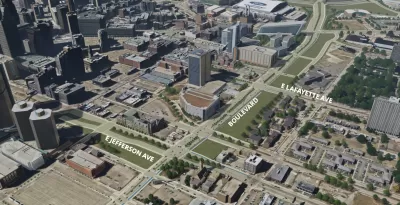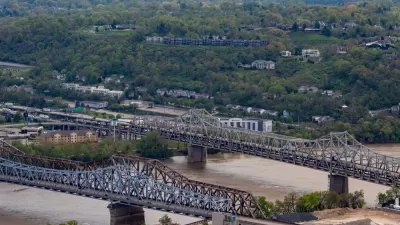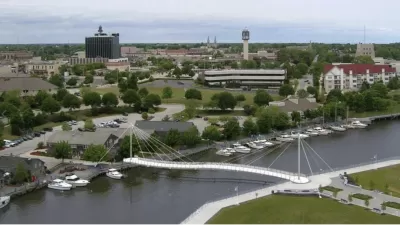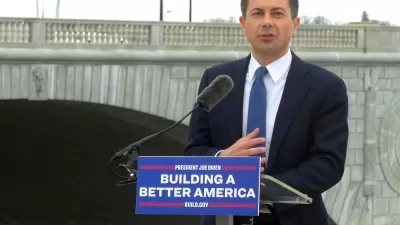The latest round of federal infrastructure funding includes the largest contribution to emerge, so far, from the 2021 infrastructure bill for the removal of an urban freeway.

The Biden administration on September 15 announced $1.5 billion in competitive grant funding for $1.5 billion for 26 highway, multimodal freight, and rail projects. Several big ticket items headlining the list, including more than $127 million for the Western Hills Viaduct replacement in Cincinnati and $105 million for the state of Michigan to convert Interstate 375 to a boulevard.
The $1.5 billion is just one funding round of a planned $7.25 billion in spending for the Infrastructure for Rebuilding America (INFRA) competitive grant program over the next four years—a total increased by 50 percent increase by the Infrastructure Investment and Jobs Act, approved at the end of 2021.
The Interstate 375 removal project is attracting the most local and national media attention among the 26 grant winners, with coverage from the Detroit News, the Washington Post, and Center Square.
“The award is the biggest step the administration has taken toward helping to remove an aging highway, fulfilling — in one community, at least — a goal the White House set when it announced infrastructure plans early last year,” according to the article by Ian Duncan for the Washington Post.
A U.S. Department of Transportation press release notes that the INFRA funding announcement will be closely followed by announcements of funding announcements for two new grant programs: the Rural Surface Transportation Grant program (RURAL). and the National Infrastructure Project Assistance program (Mega). A new, streamlined process created by the U.S. DOT allowed applicants to submit one application for all three grant programs.
The INFRA grant awards follow on the heels of several other IIJA-fueled funding announcements, including $2.2 billion for the Rebuilding American Infrastructure with Sustainability and Equity (RAISE) competitive grant funding program, $1.66 billion for the Bus and Bus Facilities and Low or No Emission Vehicle programs, and $1 billion for the “Build Back Better Regional Challenge.”

Maui's Vacation Rental Debate Turns Ugly
Verbal attacks, misinformation campaigns and fistfights plague a high-stakes debate to convert thousands of vacation rentals into long-term housing.

Planetizen Federal Action Tracker
A weekly monitor of how Trump’s orders and actions are impacting planners and planning in America.

In Urban Planning, AI Prompting Could be the New Design Thinking
Creativity has long been key to great urban design. What if we see AI as our new creative partner?

Pedestrian Deaths Drop, Remain Twice as High as in 2009
Fatalities declined by 4 percent in 2024, but the U.S. is still nowhere close to ‘Vision Zero.’

King County Supportive Housing Program Offers Hope for Unhoused Residents
The county is taking a ‘Housing First’ approach that prioritizes getting people into housing, then offering wraparound supportive services.

Researchers Use AI to Get Clearer Picture of US Housing
Analysts are using artificial intelligence to supercharge their research by allowing them to comb through data faster. Though these AI tools can be error prone, they save time and housing researchers are optimistic about the future.
Urban Design for Planners 1: Software Tools
This six-course series explores essential urban design concepts using open source software and equips planners with the tools they need to participate fully in the urban design process.
Planning for Universal Design
Learn the tools for implementing Universal Design in planning regulations.
planning NEXT
Appalachian Highlands Housing Partners
Mpact (founded as Rail~Volution)
City of Camden Redevelopment Agency
City of Astoria
City of Portland
City of Laramie





























